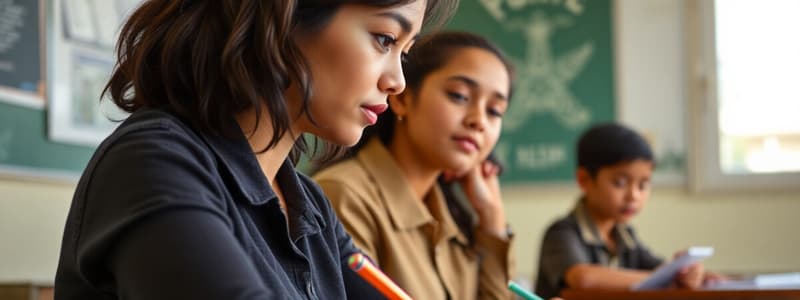Podcast
Questions and Answers
Which of the following best describes the concept of 'hidden curriculum'?
Which of the following best describes the concept of 'hidden curriculum'?
- Learning that occurs outside formal institutions through social interactions and personal experiences.
- The subjects and content explicitly taught in schools and assessed through exams.
- Unwritten, implicit lessons taught in schools, such as obedience and punctuality. (correct)
- Government-funded education provided by state schools.
According to Émile Durkheim, formal education primarily serves to reinforce class inequalities in capitalist societies.
According to Émile Durkheim, formal education primarily serves to reinforce class inequalities in capitalist societies.
False (B)
What is 'role allocation' as it relates to education, according to Davis & Moore?
What is 'role allocation' as it relates to education, according to Davis & Moore?
Davis & Moore argue that education sorts individuals into appropriate roles based on ability.
According to Karl Marx, education is part of the ______ that maintains ruling-class dominance.
According to Karl Marx, education is part of the ______ that maintains ruling-class dominance.
Match the type of school with its primary feature:
Match the type of school with its primary feature:
Which sociologist criticized private education for reinforcing class privilege?
Which sociologist criticized private education for reinforcing class privilege?
Unschooling involves a structured curriculum with predefined lessons and assessments.
Unschooling involves a structured curriculum with predefined lessons and assessments.
What is the main focus of vocational learning?
What is the main focus of vocational learning?
According to Talcott Parsons, schools act as a bridge between the family and society, shifting children from particularistic values to ______ values.
According to Talcott Parsons, schools act as a bridge between the family and society, shifting children from particularistic values to ______ values.
Match the sociologist with their view on education:
Match the sociologist with their view on education:
What is the 'correspondence principle' as described by Bowles & Gintis?
What is the 'correspondence principle' as described by Bowles & Gintis?
According to the functionalist perspective, education primarily serves the interests of capitalism rather than promoting social stability.
According to the functionalist perspective, education primarily serves the interests of capitalism rather than promoting social stability.
What is cultural capital, as introduced by Pierre Bourdieu, and how does it affect educational success?
What is cultural capital, as introduced by Pierre Bourdieu, and how does it affect educational success?
According to Heidi Hartmann, schools maintain male dominance by limiting female aspirations through ______ subject choices.
According to Heidi Hartmann, schools maintain male dominance by limiting female aspirations through ______ subject choices.
Match the type of alternative education with its description:
Match the type of alternative education with its description:
Flashcards
Formal Education
Formal Education
Structured learning in institutions like schools, colleges, and universities, following a set curriculum.
Informal Education
Informal Education
Learning outside formal institutions through social interactions, media, or personal experiences.
Official Curriculum
Official Curriculum
Subjects and content explicitly taught in schools, assessed through exams.
Hidden Curriculum
Hidden Curriculum
Signup and view all the flashcards
State/Public Schools
State/Public Schools
Signup and view all the flashcards
Private Schools
Private Schools
Signup and view all the flashcards
Selective/Non-Selective Schools
Selective/Non-Selective Schools
Signup and view all the flashcards
Single-Sex Schools
Single-Sex Schools
Signup and view all the flashcards
Co-Educational Schools
Co-Educational Schools
Signup and view all the flashcards
Faith Schools
Faith Schools
Signup and view all the flashcards
International Schools
International Schools
Signup and view all the flashcards
Online Learning
Online Learning
Signup and view all the flashcards
Homeschooling
Homeschooling
Signup and view all the flashcards
Unschooling
Unschooling
Signup and view all the flashcards
Vocational Learning
Vocational Learning
Signup and view all the flashcards
Study Notes
- Education involves both formal and informal aspects of learning that occur throughout life.
Formal and Informal Education
- Formal education is structured learning within institutions like schools and universities, following a set curriculum.
- Informal education involves learning outside formal institutions through social interactions, media, and personal experiences.
- Official curriculum includes subjects and content explicitly taught and assessed in schools.
- Hidden curriculum encompasses unwritten lessons taught in schools, like obedience, punctuality, and gender norms.
- Émile Durkheim viewed formal education as a means of socializing individuals into shared norms and values.
- Bowles & Gintis (1976) argued that the hidden curriculum reinforces class inequalities in capitalist societies.
Different Types of Schools
- State/public schools are government-funded institutions providing free education.
- Private schools require fees but often offer smaller class sizes and more resources.
- Selective schools choose students based on exams or other criteria, while non-selective schools accept all students.
- Single-sex schools exclusively educate boys or girls.
- Co-educational schools teach both boys and girls together.
- Faith schools integrate religious teachings with the standard curriculum.
- International schools follow an international curriculum and often cater to expatriate students.
- Stephen Ball (2003) criticized private education for reinforcing class privilege.
- Cecile Wright (1992) studied racial inequalities in education, showing ethnic minority students face discrimination.
Alternative Approaches to Education
- Online learning delivers education via the Internet, allowing flexibility but also potentially lacking social interaction.
- Homeschooling involves parents taking full responsibility for their children's education at home.
- Unschooling is a child-led approach where learning occurs through natural life experiences rather than structured lessons.
- Vocational learning focuses on job-related skills, combining classroom learning with practical work experience.
- Progressive schooling encourages creativity, critical thinking, and student autonomy over rote memorization.
- John Holt (1976) advocated for unschooling, arguing formal education stifles creativity.
- Ivan Illich (1971) criticized traditional schooling in Deschooling Society, arguing for informal, community-based learning.
- Albany Free School, founded in 1969, operates without grades, tests, or a fixed schedule, allowing students aged 3-14 to design daily learning plans.
- Fairhaven School, following the Sudbury model, allows students aged 5-19 complete responsibility for their education.
Functionalist View
- Functionalists see education as vital for maintaining social stability by transmitting shared norms and values.
- Émile Durkheim (1925) argued schools instill social solidarity by teaching collective conscience through subjects like history and citizenship.
- Talcott Parsons (1961) stated schools bridge the family and society, shifting children from particularistic to universalistic values.
- Davis & Moore (1945) supported meritocracy by arguing education sorts individuals into roles based on ability via role allocation.
- Bowles & Gintis (1976) challenge this view, arguing education serves capitalism rather than being meritocratic.
Marxist View
- Marxists argue education reproduces class inequalities and serves capitalism by legitimizing exploitation.
- Karl Marx (1867) viewed education as part of the ideological state apparatus maintaining ruling-class dominance.
- Bowles & Gintis (1976) developed the correspondence principle, where school structures mirror workplace hierarchies.
- Pierre Bourdieu (1986) introduced cultural capital, explaining that middle-class students succeed due to advantages valued by the system.
- Howard Becker (1971) noted material deprivation leads to working-class students being labeled negatively, reinforcing self-fulfilling prophecies.
Feminist View
- Feminists argue education perpetuates gender inequalities by reinforcing patriarchal values.
- Heidi Hartmann (1979) highlighted how schools maintain male dominance by limiting female aspirations through gendered subject choices.
- Sue Sharpe (1976, 1994) found girls prioritized marriage over careers in the 1970s, shifting towards independence by the 1990s.
- Liberal feminists, like Ann Oakley (1974), advocate reforms to promote gender equality.
- Radical feminists, such as Dale Spender (1983), argue schools systematically marginalize women by prioritizing male perspectives.
- Becky Francis (2000) notes that despite outperforming boys, girls’ achievements are often undermined.
Studying That Suits You
Use AI to generate personalized quizzes and flashcards to suit your learning preferences.



